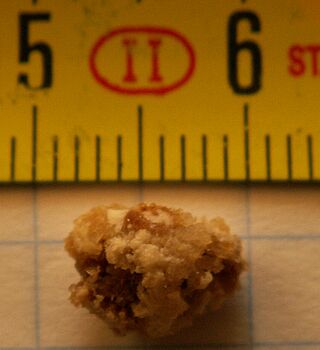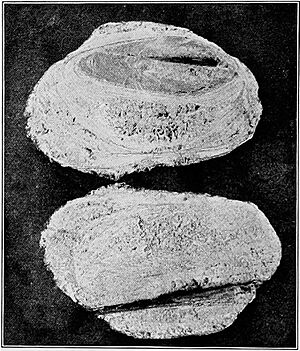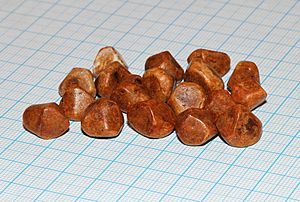Calculus (medicine) facts for kids
Quick facts for kids Calculus |
|
|---|---|

An 8-mm kidney stone
|
|
| Classification and external resources | |
| Synonyms | Stone |
| Specialty | Lua error in Module:Wikidata at line 70: attempt to index field 'wikibase' (a nil value). |
| Patient UK | Calculus |
A calculus (say "KAL-kyoo-lus"), often called a stone, is a hard lump that can form inside your body. These "stones" are usually made of minerals, like tiny crystals that stick together. When these stones form, it's called lithiasis (say "li-THY-uh-sis"). Stones can sometimes cause problems and make you feel unwell.
Calculi are different from gastroliths. Gastroliths are things you might swallow, like tiny pebbles, that stay in your stomach. Calculi, on the other hand, grow inside your body.
Contents
What Kinds of Stones Can Form?
Stones can form in many different parts of your body. Here are some common types:
- Ear stones: Tiny stones in your inner ear are called otoliths. They help you with balance.
- Urinary stones: These form in your urinary system, which includes your kidneys and bladder.
- Kidney stones: These are also called renal calculi or nephroliths. They form in your kidneys.
- Bladder stones: These are also called vesical calculi or cystoliths. They form in your bladder.
- Gallstones: These form in your gallbladder and bile ducts. They are mostly made from substances found in bile, like cholesterol.
- Nose stones: Stones in your nasal passages are called rhinoliths. They are quite rare.
- Gut stones: Stones in your digestive system are called enteroliths. These can sometimes grow very large.
- Stomach stones: These are called gastric calculi. They are different from things you might swallow.
- Saliva stones: Stones in your salivary glands (which make spit) are called sialoliths.
- Tonsil stones: These small, hard lumps form in your tonsils and are called tonsilloliths.
- Vein stones: Stones that form in your veins are called phleboliths.
- Skin stones: Though not common, stones can sometimes form in your skin, like in sweat glands.
- Navel stones: Stones that form in your belly button are called omphaloliths.
Sometimes, stones don't cause any symptoms at all. Large stones might have taken many years to grow to their size.
Why Do Stones Form?

Stones can form for a few reasons:
- Too much of a mineral: Your body might have too much of a certain mineral. For example, high levels of calcium can lead to kidney stones. What you eat can also affect gallstones.
- Local conditions: Sometimes, conditions in a specific body part can help stones form. For instance, bacteria can play a role in kidney stones. Also, if fluids flow too slowly in a certain area, like in a salivary gland, it can make stones more likely to form there.
- Indigestible material: Sometimes, things that your body can't digest can clump together. For example, bezoars are lumps of indigestible material (like hair) that can form in your stomach or intestines. These can sometimes become the starting point for an enterolith.
For kidney stones, the most common type of mineral is calcium oxalate. Another common type is uric acid. Studies have shown that uric acid stones can even encourage calcium oxalate stones to form.
How Do Stones Affect Your Body?
Stones can cause problems in several ways:
- Irritation: They can rub against nearby tissues, causing pain, swelling, and inflammation.
- Blockage: They can block an opening or a tube (called a duct). This stops normal flow and can prevent an organ from working properly.
- Infection: Because they can block flow, stones can sometimes make it easier for infections to start.
Here are some medical conditions caused by stones:
- Kidney stones (nephrolithiasis):
- Can make your kidneys swell (called hydronephrosis).
- Can lead to kidney failure if not treated.
- Can increase the risk of kidney infections (pyelonephritis).
- Urinary bladder stones (urolithiasis):
- Can block the flow of urine out of the bladder.
- Gallstones (cholelithiasis):
- Can lead to gall bladder infections (cholecystitis).
- Can cause infections in the bile ducts (ascending cholangitis).
- Can move into the main bile duct (choledocholithiasis) or cause inflammation of the pancreas (gallstone pancreatitis).
- Stomach stones: Can cause stomach pain, blockages, or even damage to tissues.
How Do Doctors Find Stones?
Doctors use different methods to find stones, depending on where they might be:
- Medical history and exam: The doctor will ask about your symptoms and do a physical check-up.
- Imaging tests:
- Some stones, especially those with a lot of calcium, can be seen on X-rays and CT scans.
- Many types of stones can be found using ultrasound.
- Lab tests: Doctors might test your blood or urine to check for levels of substances that could cause stones.
- Stone analysis: If a stone passes out of your body or is removed during surgery, it can be sent to a lab. Scientists can then figure out what it's made of. This helps doctors understand why it formed and how to prevent more.
How Are Stones Treated?
Treatments for stones vary depending on the type and location, but here are some general approaches:
- Lifestyle changes: Eating a healthy diet and getting exercise can sometimes help slow down or even stop stones from forming.
- Drinking fluids: Drinking plenty of water and other fluids (like lemon juice) is often very important, especially for urinary stones, as it helps flush them out.
- Surgery: Sometimes, doctors need to perform surgery to remove larger stones.
- Medication: Certain medicines or antibiotics might be used to help dissolve stones or treat infections caused by them.
- Shock wave therapy: Extracorporeal shock wave lithotripsy (ESWL) uses special sound waves to break stones into tiny pieces so they can pass out of the body more easily.
See Also
- Bezoar
- Calculus (dental)
- Lithotomy
 | Jackie Robinson |
 | Jack Johnson |
 | Althea Gibson |
 | Arthur Ashe |
 | Muhammad Ali |


